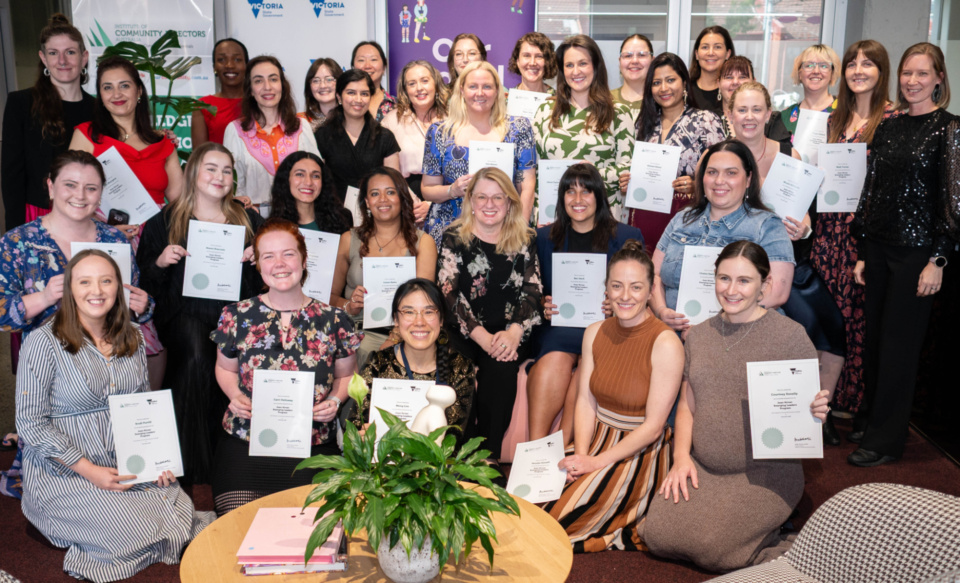
Why meetings can harm employee well-being
Posted on 10 Dec 2025
Anyone working in an organisation knows it: meetings follow one after another at a frantic pace. On…
Posted on 10 Oct 2024
By Matthew Schulz, journalist, Institute of Community Directors Australia

Campaigns can be the lifeblood of powerful community organisations, generating member and public support, donations and political clout, and a strong sense you are meeting your mission.

In a successful campaign that came to a head in late August, the LGBTQI+ community and the not-for-profit sector forced the federal government to backflip on a crucial census question.
Advocates had little time to convene and generate the rearguard action after learning the census would exclude a question on sexual orientation and gender.
The Albanese Government had announced it would scrap questions aimed at counting trans and gender-diverse people.
In response, more than 100 community and not-for-profit groups joined forces to bring the issue to the fore. A week later and after a powerful political reaction, the government relented and agreed to include the question.
A coalition of peak bodies, health experts and community organisations including Diversity Council Australia, Mental Health Australia, the Human Rights Council of Australia and Equality Australia united to urge the government to include a wider range of questions covering trans and gender-diverse people.
Significantly, a string of independent federal MPs added their names to the statement, including Allegra Spender, Zali Steggall, Warren Entsch and Helen Haines.
The plea for action urged all MPs to “to set aside political differences and focus on prioritising health and wellbeing above all else”.
The snap campaign worked as a result of a combined political, media and social media offensive along with strong data and a passionate plea.

Advocates welcomed the government’s decision to change course.
“This is the sensible, pragmatic and moral course of action that will ensure vital data about some of the most vulnerable populations in Australia is collected nationally for the first time,” Equality Australia CEO Anna Brown said.
Yet behind the apparently swift turnaround was a years-long battle for recognition, sparked by a human rights complaint by non-binary parent April Long in response to 2021 census questions. They were upset that that census failed to properly count LGBTQI+ people, and their complaint was backed by Equality Australia.
Despite the policy shift, some advocates still believe the failure to include a question on intersex people was a mistake, and the push for further reforms is likely to continue.

An ongoing battle in the not-for-profit sector is the action by community legal centres around Australia seeking a funding boost to save frontline services.
The campaign has galvanised centres and their supporters around the country as centres seek to retain their ability to help people surviving domestic violence, facing eviction, or addressing financial problems and family law dramas. While the centres help 180,000 people a year, they are forced to turn away twice that number.
As part of the campaign:
Just over a fortnight after the campaign launch, the federal government announced a $4.7 billion funding deal to address domestic and family violence, including $800 million in new money for legal aid services.
But despite the welcome development, community legal centres said they would receive only a fraction of that $800 million.
"Our sector is at breaking point right now."
Community Legal Centres Australia chairperson Arlia Fleming said the announcement was “an encouraging first step, but there is a long way to go”.
She said the federal commitment to funding legal assistance beyond July next year was an acknowledgement of the insecurity of the legal sector, but that more help was needed.
She said the $800 million extra spending over five years would be split across four types of legal help.
“This will not fix the community legal sector's workforce crisis, and it will not come close to enabling community legal centres to meet the community’s demand for our services."
She said there was no immediate funding lifeline, and that $35 million was needed before the end of the financial year to keep community legal centres afloat.
“Our sector is at breaking point right now and some will not be able to wait nine months or longer for new funding to arrive."
In the meantime, talks and the campaign for a better funding agreement continue, with the peak body urging supporters to keep up the letter-writing and pressure on decision makers.
Community Legal WA chair Brodie Lewis was among the Canberra delegates seeking more resources, and he said the situation in Western Australia echoed the national one, with organisations there turning away two-thirds of people seeking help.
He said despite the latest injection of funds, “we fear that this will mean the investment will fall vastly short of estimates needed to stem the tide of demand. This will mean more people are denied justice, because of the lack of legal help.”

Another coalition of charities and not-for-profits is pushing for Australian not-for-profits to be properly funded but is taking a largely behind-the-scenes approach.
As the name suggests, the Pay What It Takes coalition – now in its third year – is focused on educating funders and not-for-profits about the true costs of running an organisation.
The concept highlights the failed thinking that has led to chronic underinvestment in core costs and the push by some philanthropists, governments, the public and media for NFPs to keep overheads to a minimum.
The coalition has made submissions to the recent Productivity Commission review into Philanthropy and the NFP Sector Development Blueprint and is pushing for governments to instil the PWIT principles in funding decisions.
The ACT Government is one of the first on board, having agreed “to make sure funding adequately reflects the real cost of services, as well as the impact of increased demand”. The NSW Government is also examining the principles.
The effort to inform and educate has included the 2022 Paying What It Takes report, which outlined the challenge, and the September 2024 Pay What it Takes report, comprising interviews about the rollout of the principles since the 2022 report.
“We know there's a problem and we know that there is going to be a lot of different ways that we can crack this problem."

Also last month, the PWIT group released a resource toolkit for not-for-profits to help them argue the case with funders. This comes in addition to the “Reframe Overhead” push, which gives groups the data and the narratives they need to demonstrate that the “starvation cycle” fails everyone.
So far, several hundred organisations have joined the Reframe Overhead and Paying What it Takes campaigns.
Pay What It Takes coalition executive chair Jo Taylor said the campaign was tackling the underpayment problem from multiple directions.
“We know there's a problem and we know that there is going to be a lot of different ways that we can crack this problem. There's no one solution, so we're trying to create materials that inspire people to recognise the challenge and the opportunities, and to pick it up and run with it, to adapt it, and to show their own leadership in this issue.”

The push to ban gambling advertising involves a very different not-for-profit campaign approach focused on winning broad public support.
The Alliance for Gambling Reform is leading the effort, backed by powerful statistics such as those showing that losses from gambling reached $32 billion in 2023, up from $25 billion in 2019.
Alliance CEO Martin Thomas said the figures were alarming and represented “social harm on an industrial scale”.
“Australians lose more to gambling than any other nation in the world because we have a grossly inadequate regulatory regime in which the gambling industry has been allowed to operate virtually unchecked, causing devastation to individuals, families and communities,” Thomas said.
"Australians lose more to gambling than any other nation in the world."
In one media release, the Alliance pointed to a recent Red Bridge poll showing that 72% of Australians want a full gambling ad ban.
Other releases have highlighted the pope’s deep concern about gambling advertising, and shamed politicians for being “showered” with gifts from gambling companies, racing clubs and lobbyists.
The Alliance is pushing for the government to adopt the 31 recommendations of late Labor MP Peta Murphy, including a total ban on gambling advertisements and the creation of a new national regulator.

The Alliance has relied on a powerful ally, chief advocate Reverend Tim Costello, a renowned and respected social advocate and deft media commentator.
In the most recent release, he did not pull his punches about the gambling lobby.
“These results show how our political system can be exploited by the rich and powerful to lobby in secret against popular changes such as the proposed gambling ad ban, to the detriment of the Australian community,” Costello said.
Not-for-profit media and marketing expert Brett de Hoedt said the anti-gambling advertising campaign was able to cut through because of the widespread awareness of sports betting advertising and the associated annoyance factor.
“There is already a pre-existing disgust, dislike and distrust of the sports betting industry,” de Hoedt said.
“We're sick of their loud, boorish ads every ad break when we're trying to watch The Block, or women in the country seeking husbands from farmers. We are also very aware of the billions of dollars that are being spent by all sorts of people, particularly young people.
“There is a pre-existing distaste for the issue, a pre-existing desire for a solution, and the solution being offered is very, very simple.”

The not-for-profit sector’s Fix Fundraising effort is now in its seventh year, with the unofficial push for reforms a decade old.
Advocates argue that the sector can’t hang on much longer, especially if they are to help the government meet its goal of doubling philanthropy by 2030.
Confusing fundraising laws and regulations have meant fundraisers working with charities and not-for-profits need to follow different rules and licensing systems from state to state, creating a red tape burden that costs groups up to $12 million a year.
A coalition of fundraising organisations have banded together to force the issue, and even the current commissioner of the Australian Charities and Not-for-profits Commission, Sue Woodward, used to be involved, in her former role with Justice Connect.
"We need all governments to work together."
Not surprisingly, Woodward is sympathetic to reforms, as is Charities Minister Andrew Leigh, who recently wrote to all states and territories urging them to act on their promises. The biggest drag on change appears to be the laggard states that are yet to enact regulatory changes, with only South Australia, Victoria and the ACT having taken all the necessary steps.
The current head of not-for-profit law at Justice Connect, Geraldine Menere, said 18 months was long enough to wait for national fundraising principles to be adopted.
“We need all governments to work together in a coordinated and collaborative way, and, in consultation with the sector, to develop uniform regulatory guidance to support charities to understand and comply with the principles.”
Campaigning and advocacy help sheets: Working with the media | Advocacy and government | Advocacy for legislation and regulation | The boundaries of advocacy work | Getting starting in advocacy | Campaign collaboration | Advocacy ‘circles’
More great guidance: The golden rules of campaigning | Unlocking the doors to the corridors of power | The inside story of the Voices for Indi movement | How a cause day can help your NFP | Ten questions every board director needs to ask about marketing | Five tips for getting media coverage | Working with celebrities and VIPs | Communication helpsheets

Posted on 10 Dec 2025
Anyone working in an organisation knows it: meetings follow one after another at a frantic pace. On…

Posted on 10 Dec 2025
As a qualified yoga instructor who learned the practice in her hometown of Mumbai, Ruhee Meghani…

Posted on 10 Dec 2025
Community Directors trainer Jon Staley knows from first-hand experience the cost of ignoring…

Posted on 10 Dec 2025
Stressed, overwhelmed, exhausted… if you’re on a not-for-profit board and these words sound…

Posted on 10 Dec 2025
The Institute of Community Directors Australia trains over 22,000 people each year, which gives us…

Posted on 03 Dec 2025
Many not-for-profit (NFP) board members in Australia are burnt out, overwhelmed and considering…

Posted on 26 Nov 2025
A roll call of Victoria’s brightest future leaders has graduated from a testing and inspiring…

Posted on 12 Nov 2025
At the Institute of Community Directors Australia, we believe that stronger communities make a…

Posted on 12 Nov 2025
Like many Community Directors members, Hazel Westbury is a community leader who isn’t easily…

Posted on 11 Nov 2025
I’ve seen what happens when fear of conflict wins out over taking a principled stand.

Posted on 11 Nov 2025
‘It’s not a question of enough, pal. It’s a zero-sum game. Somebody wins and somebody loses’.

Posted on 11 Nov 2025
Progressive economic Richard Denniss believes the constant hunt by governments for the political…